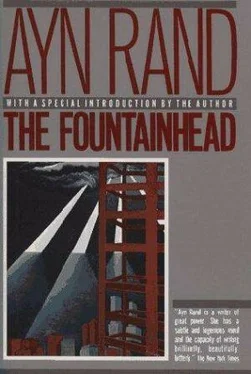AYN RAND
THE FOUNTAINHEAD
To Frank O'Connor
Introduction to the Twenty-fifth Anniversary Edition
Many people have asked me how I feel about the fact that The Fountainhead has been in print for twenty-five years. I cannot say that I feel anything in particular, except a kind of quiet satisfaction. In this respect, my attitude toward my writing is best expressed by a statement of Victor Hugo: "If a writer wrote merely for his time, I would have to break my pen and throw it away."
Certain writers, of whom I am one, do not live, think or write on the range of the moment. Novels, in the proper sense of the word, are not written to vanish in a month or a year. That most of them do, today, that they are written and published as if they were magazines, to fade as rapidly, is one of the sorriest aspects of today's literature, and one of the clearest indictments of its dominant esthetic philosophy: concrete-bound, journalistic Naturalism which has now reached its dead end in the inarticulate sounds of panic.
Longevity-predominantly, though not exclusively-is the prerogative of a literary school which is virtually non-existent today: Romanticism. This is not the place for a dissertation on the nature of Romantic fiction, so let me state — for the record and for the benefit of those college students who have never been allowed to discover it — only that Romanticism is the conceptual school of art. It deals, not with the random trivia of the day, but with the timeless, fundamental, universal problems and values of human existence. It does not record or photograph; it creates and projects. It is concerned — in the words of Aristotle — not with things as they are, but with things as they might be and ought to be.
And for the benefit of those who consider relevance to one's own time as of crucial importance, I will add, in regard to our age, that never has there been a time when men have so desperately needed a projection of things as they ought to be.
I do not mean to imply that I knew, when I wrote it, that The Fountainhead would remain in print for twenty-five years. I did not think of any specific time period. I knew only that it was a book that ought to live. It did.
But that I knew it over twenty-five years ago — that I knew it while The Fountainhead was being rejected by twelve publishers, some of whom declared that it was "too intellectual", "too controversial" and would not sell because no audience existed for it — that was the difficult part of its history; difficult for me to bear. I mention it here for the sake of any other writer of my kind who might have to face the same battle — as a reminder of the fact that it can be done.
It would be impossible for me to discuss The Fountainhead or any part of its history without mentioning the man who made it possible for me to write it: my husband, Frank O'Connor.
In a play I wrote in my early thirties, Ideal, the heroine, a screen star, speaks for me when she says: "I want to see, real, living, and in the hours of my own days, that glory I create as an illusion. I want it real. I want to know that there is someone, somewhere, who wants it, too. Or else what is the use of seeing it, and working, and burning oneself for an impossible vision? A spirit, too, needs fuel. It can run dry."
Frank was the fuel. He gave me, in the hours of my own days, the reality of that sense of life, which created The Fountainhead — and he helped me to maintain it over a long span of years when there was nothing around us but a gray desert of people and events that evoked nothing but contempt and revulsion. The essence of the bond between us is the fact that neither of us has ever wanted or been tempted to settle for anything less than the world presented in The Fountainhead. We never will.
If there is in me any touch of the Naturalistic writer who records "real-life" dialogue for use in a novel, it has been exercised only in regard to Frank. For instance, one of the most effective lines in The Fountainhead comes at the end of Part II, when, in reply to Toohey's question: "Why don't you tell me what you think of me?" Roark answers: "But I don't think of you." That line was Frank's answer to a different type of person, in a somewhat similar context. "You're casting pearls without getting even a pork chop in return," was said by Frank to me, in regard to my professional position. I gave that line to Dominique at Roark's trial.
I did not feel discouragement very often, and when I did, it did not last longer than overnight. But there was one evening, during the writing of The Fountainhead, when I felt so profound an indignation at the state of "things as they are" that it seemed as if I would never regain the energy to move one step farther toward "things as they ought to be." Frank talked to me for hours, that night. He convinced me of why one cannot give up the world to those one despises. By the time he finished, my discouragement was gone; it never came back in so intense a form.
I had been opposed to the practice of dedicating books; I had held that a book is addressed to any reader who proves worthy of it. But, that night, I told Frank that I would dedicate The Fountainhead to him because he had saved it. And one of my happiest moments, about two years later, was given to me by the look on his face when he came home, one day, and saw the page-proofs of the book, headed by the page that stated in cold, clear, objective print: To Frank O'Connor.
I have been asked whether I have changed in these past twenty-five years. No, I am the same — only more so. Have my ideas changed? No, my fundamental convictions, my view of life and of man, have never changed, from as far back as I can remember, but my knowledge of their applications has grown, in scope and in precision. What is my present evaluation of The Fountainhead? I am as proud of it as I was on the day when I finished writing it.
Was The Fountainhead written for the purpose of presenting my philosophy? Here, I shall quote from The Goal of My Writing, an address I gave at Lewis and Clark College, on October 1, 1963: "This is the motive and purpose of my writing; the projection of an ideal man. The portrayal of a moral ideal, as my ultimate literary goal, as an end in itself — to which any didactic, intellectual or philosophical values contained in a novel are only the means.
"Let me stress this: my purpose is not the philosophical enlightenment of my readers ... My purpose, first cause and prime mover is the portrayal of Howard Roark (or the heroes of Atlas Shrugged) as an end in himself ...
"I write — and read — for the sake of the story ... My basic test for any story is: 'Would I want to meet these characters and observe these events in real life? Is this story an experience worth living through for its own sake? Is the pleasure of contemplating these characters an end in itself?' ...
"Since my purpose is the presentation of an ideal man, I had to define and present the conditions which make him possible and which his existence requires. Since man's character is the product of his premises, I had to define and present the kinds of premises and values that create the character of an ideal man and motivate his actions; which means that I had to define and present a rational code of ethics. Since man acts among and deals with other men, I had to present the kind of social system that makes it possible for ideal men to exist and to function — a free, productive, rational system which demands and rewards the best in every man, and which is, obviously, laissez-faire capitalism.
"But neither politics nor ethics nor philosophy is an end in itself, neither in life nor in literature. Only Man is an end in himself."
Are there any substantial changes I would want to make in The Fountainhead? No — and, therefore, I have left its text untouched. I want it to stand as it was written. But there is one minor error and one possibly misleading sentence which I should like to clarify, so I shall mention them here.
Читать дальше










